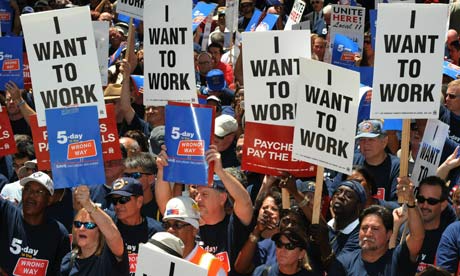
Jobless millions signal death of the American dream for many
Even the criminals have fallen on hard times in America's poorest city as the long-term unemployed struggle to keep a grasp on normalityRichard Gaines is one of the best-known faces on Camden's (NJ) Haddon Avenue. It is a rough-and-tumble street, lined with cheap businesses and boarded-up houses, and is prey to drug gangs. Gaines, 50, runs a barbershop, a hair salon and a fitness business. He works hard and is committed to his community. But Haddon Avenue is not an easy place to make a living in the best of times. And these are far from the best of times.
Just how badly the great recession has struck this fragile New Jersey city, which is currently the poorest in America, was recently spelled out to Gaines. In happier times � whatever that might mean for a city as destitute as Camden � local businesses on Haddon Avenue could at least rely on a bit of trade from those who made their money on the street.
Young men bought flashy clothes and got sharp haircuts and always paid in cash. But no longer. The economy is now so bad in Camden that even the criminals are struggling and going short. "Even the guys who got money from illegal means really don't want to spend it," Gaines said.
Such a development, though, is just a snapshot of the deep problems still hitting the wider American economy. Growth rates are stuttering and a recovery is struggling to take hold. It may even now be showing signs of going backwards again, as countries such as Germany start to power forward. Joblessness has taken hold in America, with the numbers of long-term unemployed reaching levels not seen since the Depression of the 1930s. The figures are frightening and illustrate a society that remains in deep trouble.
The headline jobless figure of 9.5% is bad enough but does not begin to convey the problem as it fails to measure those who have stopped looking for work. Over the past three months alone more than a million Americans have fallen into that category: effectively giving up hope of finding a job and dropping out of the official statistics. Such cases now number some 5.9 million and their ranks are likely to grow as millions more find their jobless status becoming a permanent state of hopelessness. Surveys show that with each passing week on the dole their chances of finding a job get slimmer. ..........(more)
The complete piece is at:
http://www.guardian.co.uk/world/2010/aug/15/jobless-millions-death-american-dream